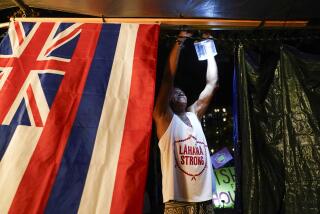The High Price of Paradise
- Share via
In many ways, the influx of Hawaiians to Las Vegas and Clark County says more about Hawaii than it does about Las Vegas.
Like Vegas, the 50th state has its own anomalous economy, one driven almost exclusively by tourism and the trade of its limited real estate. During the late 1980s, a wave of Japanese investment helped drive up residential home prices in Hawaii by about 90%, creating an exodus of Hawaiians who were “land rich but cash poor,” in the words of playwright Edward Sakamoto, whose 1992 play, “Aloha, Las Vegas,” paid homage to the trend. Retirees living on modest pensions realized that they could sell their homes for $350,000 and purchase a brand-new one for $100,000.
When the Japanese investment bubble burst in 1992, Hawaii plunged into a recession that continued for the rest of the decade. Hawaii’s tourism industry took a hard hit when California, its biggest source of visitors, saw its aerospace industry collapse. By the end of 1996, the unemployment rate in Hawaii stood at 6.4%, compared to 4.6% on the mainland. The 2000 census showed that for the first time, more people--mostly the young and middle-aged--were abandoning Hawaii rather than settling there.
Las Vegas was in the midst of a growth spurt that began with the opening of the Mirage hotel in 1989. There were more restaurant, construction and retail jobs--mainstays of Hawaii’s economy--than people to fill them. When it needed employees to staff its new Las Vegas stores, Longs Drugs recruited them directly from its chains in Hawaii--and then set up a Hawaiian aisle in every store where they could get tropical juices, tins of Vienna sausages and fresh poi.
Although many of these jobs did not pay any more than comparable ones in Hawaii, the cost of living in Las Vegas was so much lower that people’s money went a lot further. A family living on Oahu needs an additional 27% in income to maintain a lifestyle comparable to that of an urban family in the continental U.S. For Hawaiians in Las Vegas, going to the grocery store, where a gallon of milk costs less than half as much as it does back home, can be an exhilarating experience.--Lisa Leff
More to Read
Sign up for The Wild
We’ll help you find the best places to hike, bike and run, as well as the perfect silent spots for meditation and yoga.
You may occasionally receive promotional content from the Los Angeles Times.






